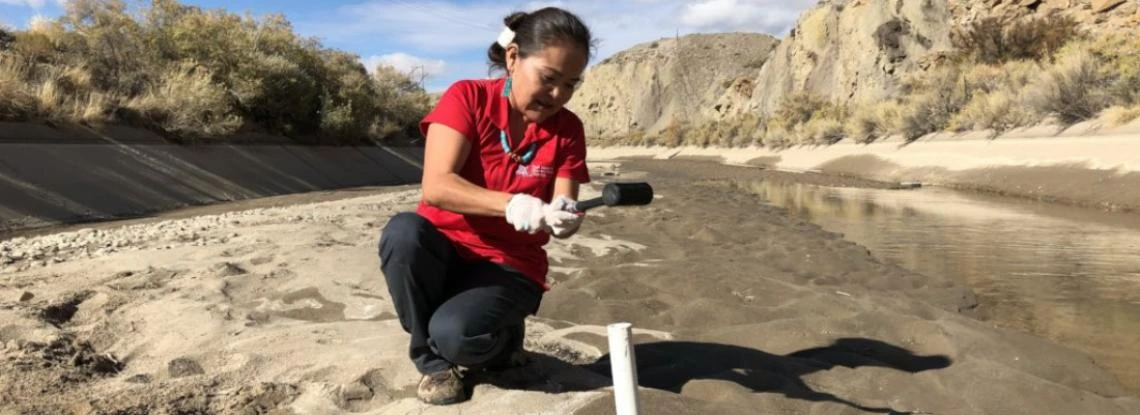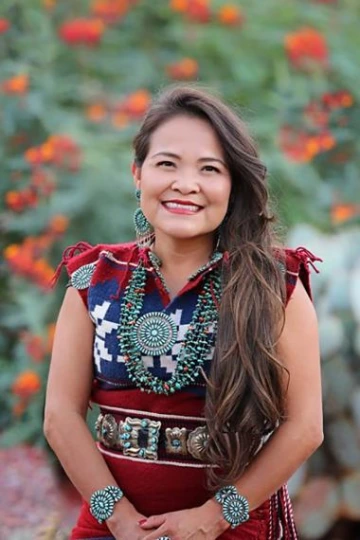Karletta Chief Receives AGU Ambassador Award and Conferred Fellowship

Karletta Chief, Associate Professor and Extension Specialist in the University of Arizona Department of Environmental Science and Principal Investigator for the NSF-NRT “Indige-FEWSS” program, is one of 36 American Geophysical Union honorees this year, receiving the AGU Ambassador Award and a conferred fellowship.
Chief received the AGU Ambassador Award and the fellowship for pioneering engagement and partnership with Indigenous communities, leading to transformative outcomes for Native American tribes and institutions.
“Yá’át’ééh. Thank you to AGU for the honor of receiving the 2020 AGU Ambassador Award,” Chief said. “Thank you to my AGU colleagues for nominating me. I am extremely honored that the community-based and community-driven research that I do with my team on water challenges facing Indigenous communities is recognized. Thank you for taking the time, care and dedication to submit a nomination packet on my behalf. I would like to dedicate my Ambassador Award to my late aunt Virginia Tallman who passed away this week from COVID-19. Ahe’hee.”

Chief is Diné (Navajo) and grew up in Black Mesa, Arizona. She received a B.S. and M.S. in Civil and Environmental Engineering from Stanford University and her Ph.D. in Hydrology and Water Resources from UArizona. She completed her post-doctorate at the Desert Research Institute in Las Vegas, Nevada.
Chief’s research aims to improve our understanding, tools, and predictions of watershed hydrology, unsaturated flow in arid environments, and how natural and human disturbances affect soil hydrology through the use of physically based methods.
Chief said, “I believe in the inclusion of Indigenous communities in Earth and space sciences using a culturally based, Indigenous led approaches. In this way, we can support a pathway for more Indigenous students and co-design solutions.”
Chief is deeply engaged in outreach efforts among Native American communities, providing and applying relevant science in a culturally sensitive manner. She focuses on how Indigenous communities will be affected by climate change, collaborating on a project to improve hydrological models to identify and mitigate risks to these vulnerable populations.
Chief’s nomination letter states, her work has “profound and sustained positive impacts on Native American nations across the United States and has set an example for meaningful engagement between scientists and Indigenous communities worldwide, with profound societal impacts.”
Chief is a member of the Indigenous Peoples Climate Change Working Group, Rising Voices, and Climate and Traditional Knowledges Workgroup with a focus on climate impacts to tribal waters. As part of a national network of Indigenous and non-Indigenous scientists focusing on climate change impacts to Indigenous peoples, Chief co-authored several articles in Climate Change and Indigenous Peoples in the United States: Impacts, Experiences, and Actions.
She also co-authored the “Tribes” chapter in the Southwest Climate Assessment Report and provided provisional guidelines for considering traditional knowledge in climate change initiatives. Chief has worked with the Pyramid Lake Paiute Tribe since 2009 focusing on collaborative water management planning under climatic and non-climatic stressors and is a member of the Groundwater, Climate and Stakeholder Engagement Project focused on adaptive water planning and management to future climate uncertainties.
Sharon Megdal, Director of the University of Arizona Water Resources Research Center (WRRC) and one of Chief’s nominators, wrote in her letter of support, “She has done remarkable work with her programmatic activities concentrating on problems and solutions with societal impact, while being designed to encourage many to pursue careers in science. This includes the mentorship of Indigenous students, the creation of a graduate student training program that is unique to support interdisciplinary training of Indigenous students as the next generation of leaders, and partnerships with tribal institutions.”
Chief supervises and advises the research of 11 students—10 of whom are Native American working on topics related to tribal environmental issues—and serves as a faculty advisor to UArizona’s American Indian Science and Engineering Chapter. With her students, Chief developed educational modules for tribal colleges on the environmental impacts of mining.
Chief currently leads a five-year, $3 million program funded by the National Science Foundation. The program, Indigenous Food, Energy and Water Security and Sovereignty, or Indige-FEWSS, is an innovative collaboration between UArizona and Diné College in the Navajo Nation, the oldest tribal college and university, or TCU, partnership in the country. Indige-FEWSS aims to develop a diverse workforce with intercultural awareness and Food-Energy-Water Security (FEWS) expertise to address FEWS challenges in indigenous communities, using traditional ecological knowledge and culturally sensitive science.
“Dr. Karletta Chief is, simply stated, an amazing individual, a path blazer, and a role model for scientists of any age and background,” said Megdal.
AGU presents their annual awards to early career, mid-career and senior scientists in the Earth and space sciences. The Ambassador Award is given annually to one to five honorees in recognition of their outstanding contributions to one or more of the following areas: societal impact, service to the Earth and space community, scientific leadership, and promotion of talent/career pool. The Ambassador Award honors individuals whose achievements extend beyond those recognized by traditional scientific discipline awards.
The 2020 honorees will be recognized and celebrated at the virtual AGU Fall Meeting on December 9.
